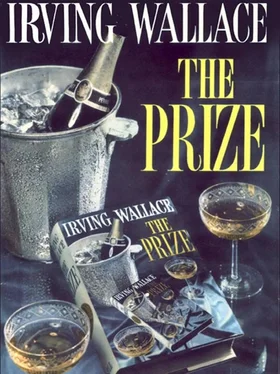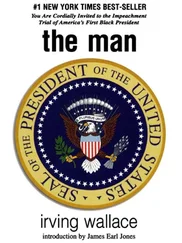His mind weakly groped to recall the details of their last loving. He threw aside the blanket, and she lifted her nightgown above her breasts. The room was night-chilled, and he hurried for their flesh to warm them, and poised above her he saw that the nipples had hardened to points in the cold, and the cold had come across the prow of the ferry and into the car. He searched the face and was not surprised it was Lilly’s.
He pressed his head into the golden-haired pillow and remembered no more, except-
Welcome to Sweden.
THE seven-storey Grand Hotel of Stockholm, located on the quay at S. Blasieholmsh 8, faced the majestic Royal Palace, directly across the Strommen canal, as an equal.
Few hotels in Europe, and none in Scandinavia, surpassed the Grand Hotel of Stockholm. It had been erected in 1874, when Ulysses S. Grant was President of the United States and Benjamin Disraeli the Prime Minister of England, and except for certain renovations of the rooms and suites in a recent decade, it remained unchanged, proud of its years and high esteem.
Unlike most hotels, in dark December the Grand was more crowded and more festive than in the summer months. While the two veranda grills were closed, because of their exposure to the cold weather, the ornate inner Breakfast Room, off the lobby, and the enormous three-storey Winter Garden, with its dome of glass, and balconies, and pillared arches, abounded with visitors and their hosts.
There were precisely 297 rooms in the Grand Hotel, smartly serviced by a trained staff of 550 men and women, and on this early morning of the third of December, every room was accounted for if not occupied. There were six choice suites, each with its pair of entry halls, sitting-room, one bedroom with twin beds or two bedrooms with single beds, and large bathroom furnished with two wash-basins, toilet, and bidet, and annually, at this time of the year, these suites were held in reserve for the Nobel Prize winners summoned to Stockholm. The use of these rooms for seven days, and the Continental breakfasts, were entirely paid for by the Nobel Foundation.
This year, five of the six choice suites had been reserved, and this early morning of the third of December, four of the five were already filled by Nobel guests from Paris, Rome, Georgia, California, and the fifth was being held in immaculate readiness for the delayed arrival of the literature laureate from Wisconsin…
The sleek Foreign Office limousine made a graceful U turn, bending around the row of taxis parked on the quay, and drew up before the impressive, gaping entrance to the Grand Hotel.
Andrew Craig, crowded into a corner of the rear seat by Ingrid Påhl’s ample person, puffed his pipe, perhaps faster than he knew, and waited. During the entire drive from the station, he had been relatively uncommunicative. He had replied to the questions directed at him briefly, and in as friendly a manner as possible, then lapsed into silence, while Leah nervously carried on, making fanciful excuses for their change of plans in Copenhagen and bubbling over the sights outside the car window. Craig hardly glanced outside the window at all. His disinterest and silence came, not from the Scotch-nearly a fifth-that he had consumed in the night or any resultant hangover, but from a growing apprehension, a reluctance to revisit the hotel where Harriet and he had spent their first honeymoon night abroad a decade ago.
Now they had arrived, and the emotionally charged meeting was at hand. The doorman, wearing a long military coat that made him resemble a refugee White Russian officer, had opened the car, and stood rigidly at attention, fingers to the brim of his cap. Krantz scrambled out first, and then Count Bertil Jacobsson closed Krantz’s jump seat, and his own, and worked his way out of the car. Leah followed him, and Ingrid Påhl followed her, and then it was Craig’s turn.
While porters struggled with the cases, Craig stood on the wooden board walk and surveyed the magnificent vista that he had remembered so well. The Strommen canal was placid and unfrozen beneath the pale sun. Off to one side, two white excursion boats lay at anchor before the National Gallery. Across the way, like an ancient lion at rest with paws extended, sat the familiar eighteenth-century Royal Palace, and behind it was the spire of the hallowed Riddarholm Church. Over the canal, linking the new city with the Old Town, stretched the bridge known as Strömbron, dotted with pedestrians and pygmy automobiles and a bright blue tram. At a distance rose the massive Royal Opera House, and hidden behind it, he recalled, was the busy square called Gustav Adolfs Torg.
Jacobsson was beside him, blowing condensed air into the palms of his reindeer leather gloves. ‘I am truly regretful we could not order warmer weather for you, Mr. Craig. The sun is deceptive. Actually, it is below fifty degrees Fahrenheit. But at least, it has not snowed. I am told it will not for another month.’
‘I’m used to this weather, to worse weather, where I come from,’ said Craig.
‘You mentioned that you were here before?’
‘Yes. Some years after the war.’ He turned and recognized the huge revolving doors. ‘Nothing has changed.’
‘Well, we might as well go inside, get the chill out of our bones.’
Craig saw that Leah, flanked by the other two members of the reception committee, had preceded them, and he followed the old Count through the revolving doors and inside. Slowly, he ascended the eight stone stairs, the rubber matting muffling his shoes, and now he was in the lobby.
While Jacobsson continued after the others to the reception desk, Craig remained motionless at the top of the stairs.
Nothing had changed, nothing at all. The main lobby was as vast as ever, and between the two pillars, the sitting-room and on either side of the pillars, the elevators marked Hiss . Walking slowly to his right, he circled the main lobby. There was the smaller reading room, with its fat chairs, and glittering glass showcases featuring Guerlain perfumes, Silvanders’ ties, Kosta goblets, Sjögren jewellery. Next came the towering door with the sign ‘Grands Veranda’, and this was the Breakfast Room. Alongside were more showcases with Orrefors vases and Jensen silver, and then a chocolate kiosk, and suddenly he came upon the narrow news-stand with its assortment of foreign newspapers and magazines. Here it was that Harriet went daily, every afternoon before cocktails, for her day-old Paris edition of the New York Herald Tribune .
He was not moved. There was no nostalgia at all. No bittersweet memory ached inside. Yet nothing had changed, except himself.
When he reached the others at the portier’s desk, Leah was before him. ‘There’s no mail, except a funny cable from Lucius and something about the new omnibus edition from your publisher. Do you want to read them?’
‘Later.’
Her forehead creased. ‘You were looking around. Is it different?’
‘Oh, yes. I’d almost forgotten everything. After all, we were here only a week.’
‘I’m terribly excited, Andrew. I’ve never been in a place like this before.’
Jacobsson approached them from the reservation counter. ‘I am sorry holding you up,’ he said courteously, ‘but there was a blunder about your rooms. They gave you suite 225. That is one of the most desirable suites, looking down on the canal, but it has only one bedroom with twin beds. They thought you were married.’
Leah’s colour rose in her cheeks. ‘What are you going to do?’
‘I explained. You will have the same suite, of course, but they are arranging to free an adjoining single bedroom. It will be ready in an hour. It can be made to connect with the drawing-room. Meanwhile, the original suite is ready.’
Читать дальше












